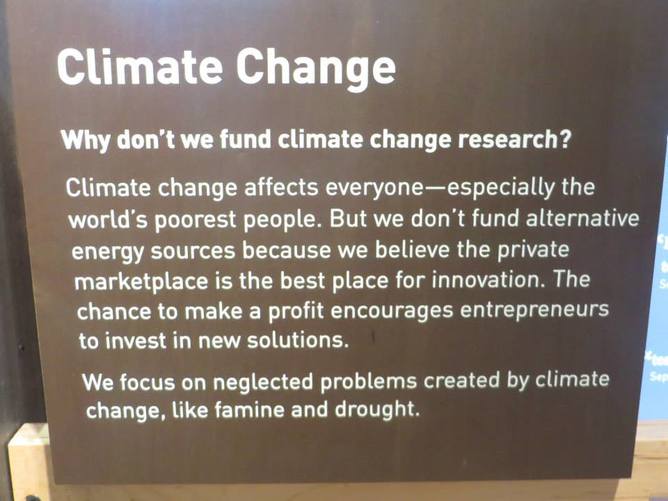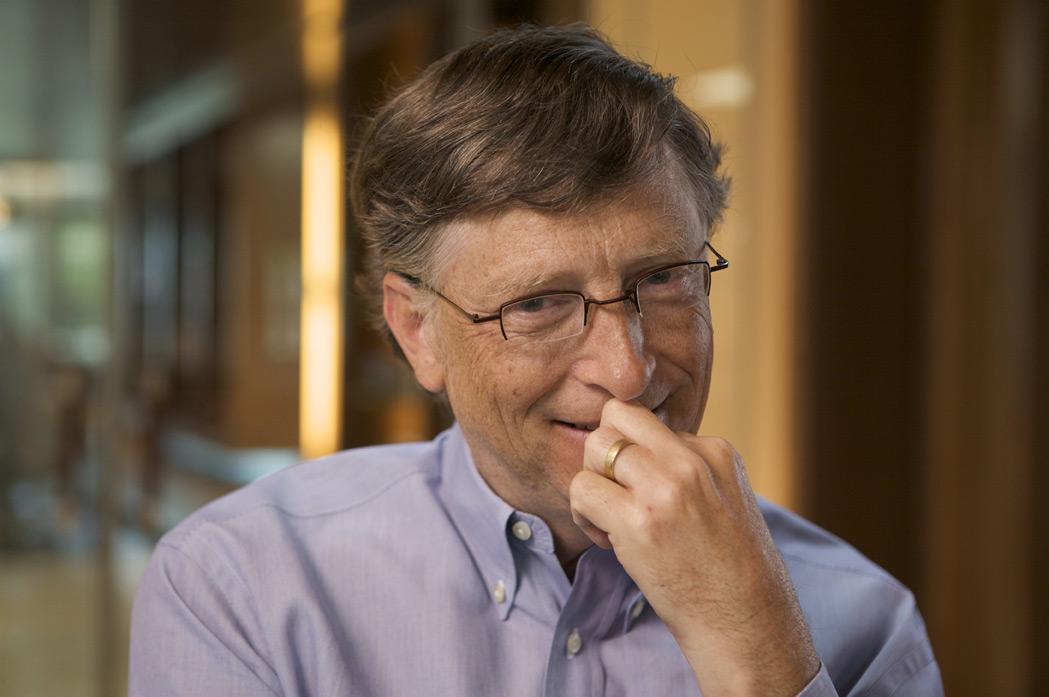Is Bill Gates' desire to help tackle the world’s problems compatible with his foundation’s huge fossil fuel investments? Photo credit: OnInnovation (cc)
By Matthew Rimmer, Australian National University. This article was originally published on The Conversation (cc). Read the original article.
This week, The Guardian newspaper has campaigned for the Bill and Melinda Gates Foundation to divest its fossil fuel investments – which the newspaper claims are worth US$1.4 billion.
The foundation can and should address the climate crisis, particularly given the threat it poses to food security, public health, human rights, and the development agenda.
Practical responses
The Gates Foundation has made a significant contribution to practical responses to poverty, and Bill Gates has been a long-standing advocate of “creative capitalism” to address global development issues.
To their credit, Bill and Melinda Gates have shown great personal engagement with larger questions about human development, and their foundation has been a significant actor in the fields of agriculture, global health, education, and population.

Bill Gates during a 2013 speech on climate change. Photo: Matthew Rimmer.
Yet it has also been reluctant to address the climate question directly, stating:
"The foundation believes that climate change is a major issue facing all of us, particularly poor people in developing countries, and we applaud the work that others are doing to help find solutions in this area,"
and:
"While we do not fund efforts specifically aimed at reducing carbon emissions, many of our global health and development grants directly address problems that climate change creates or exacerbates."

Sign on climate change at the Gates Foundation. Photo: Matthew Rimmer.
For instance, the foundation highlights its agricultural development initiative, which it says will “help small farmers who live on less than $1 per day adapt to increased drought and flooding through the development of drought and flood resistant crops, improved irrigation efficiency, and other means”.
While this certainly involves indirectly responding to climate change, it doesn’t put the issue of preventing climate change at the heart of the issue.
In his annual letter, Bill Gates noted:
"It is fair to ask whether the progress we’re predicting will be stifled by climate change… The most dramatic problems caused by climate change are more than 15 years away, but the long-term threat is so serious that the world needs to move much more aggressively — right now — to develop energy sources that are cheaper, can deliver on demand, and emit zero carbon dioxide."
This is a somewhat curious statement, given the real and present danger already posed to food security, biodiversity, public health, and human security.
The energy question
Bill Gates has another keen interest: energy security. He has discussed what he sees as the need for an “energy miracle” to remedy the climate:
"To have the kind of reliable energy we expect, and to have it be cheaper and zero carbon, we need to pursue every available path to achieve a really big breakthrough."
He seems to have been interested in nuclear power, carbon capture, and geo-engineering - rather than renewable energy.
For her part, Melinda Gates has been highly critical of climate deniers, emphasising the need for politicians to heed climate science.
The Naomi Klein factor
See video: This Changes Everything - Naomi Klein
In a 2013 article in the Nation, the writer Naomi Klein expressed concerns about the huge fossil fuel holdings of some charities, including the Gates Foundation, and argued that this was inconsistent with public health goals:
"A top priority of the Gates Foundation has been supporting malaria research, a disease intimately linked to climate… Does it really make sense to fight malaria while fueling one of the reasons it may be spreading more ferociously in some areas?"
In her 2014 book, This Changes Everything, she went on to criticise the efforts of green billionaires to save us from climate change. Of Bill Gates and his foundation, she wrote:
"Though he professes great concern about climate change, the Gates Foundation had at least $1.2 billion invested in just two oil giants, BP and ExxonMobil, as of December 2013, and those are only the beginning of his fossil fuel holdings."
Gates has been directly questioned on this issue, both in an interview with a Dutch journalist and during a 2013 appearance on the Australian Broadcasting Corporation’s Q&A program.
See video: Bill Gates on ABC’s Q&A
Klein has also criticised Bill Gates' technocratic approach to the climate crisis, considering him to be overly dismissive of renewable energy:
"When Gates had his climate change epiphany, he too immediately raced to the prospect of a silver-bullet techno-fix in the future - without pausing to consider viable - if economically challenging - responses in the here and now."
Will The Guardian’s campaign succeed?
The Guardian’s editor Alan Rusbridger has pledged to put climate change at the “front and centre” of the newspaper’s coverage, lending support to the global divestment movement and urging philanthropic trusts like the Gates Foundation and Britain’s Wellcome Trust to follow the example of the Rockefeller Brothers Fund.
See video: Keep It In The Ground
The Guardian said it recognised that the Gates Foundation has made “a huge contribution to human progress and equality by supporting scientific research and development projects”, but warned that “investments in fossil fuels are putting this progress at great risk, by undermining your long term ambitions.”
The campaign urges the Gates Foundation “to commit now to divesting from the top 200 fossil fuel companies within five years and to immediately freeze any new investments in those companies”. Rusbridger wrote that this would be “a small but crucial step in the economic transition away from a global economy run on fossil fuels”.
Hopefully, the campaign will be successful. Bill and Melinda Gates have certainly shown a willingness in the past to revise their approach, in light of new evidence, and both have been disturbed by the politics of climate denial.
The Gates Foundation can make a stronger contribution to the battle against climate change, especially given how the climate issue cuts across its food security, public health, and human rights aims. This is one way it can do so.



Recommended Comments
Join the conversation
You can post now and register later. If you have an account, sign in now to post with your account.